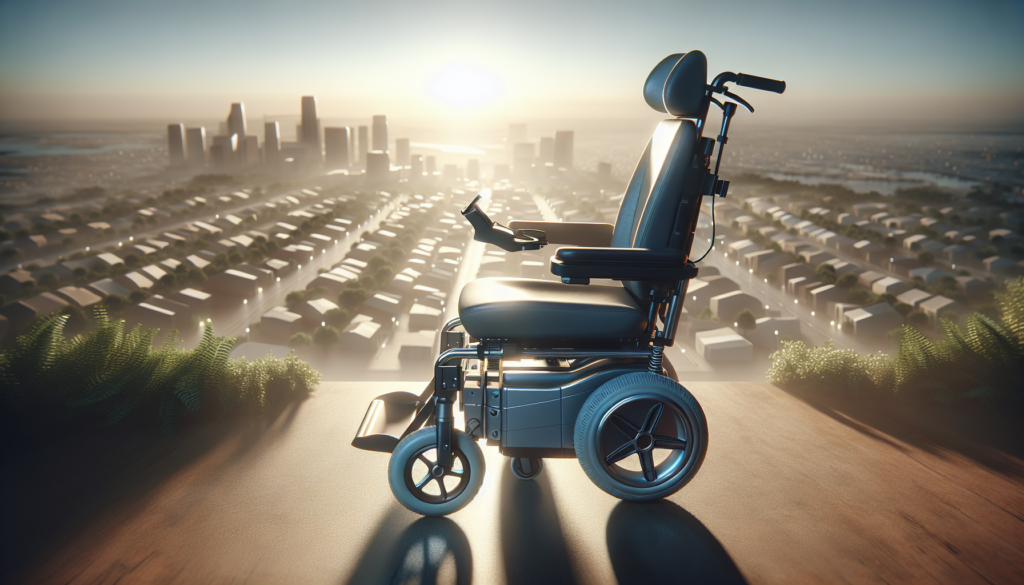
When it comes to choosing the right electric wheelchair, one of the most critical factors to consider is weight. The weight of an electric wheelchair can significantly impact its performance, mobility, and user experience. Heavier models can be more challenging to transport and maneuver, while lighter options may offer greater ease of use and flexibility. In this comprehensive guide by EKO Life MY, we will explore the importance of weight in electric wheelchairs, examining how it affects various aspects such as ease of transport, battery efficiency, and overall user comfort, so you can make an informed decision about which electric wheelchair best suits your needs.
Understanding the Impact of Weight on Mobility
The weight of an electric wheelchair plays a crucial role in determining its overall mobility and usability. Heavier models, such as the Edegree EW1 weighing 38kg, may offer stronger features like higher maximum load capacity and enhanced climbing abilities, but they can limit accessibility for some users, especially those needing to transport their wheelchair.
Conversely, lighter electric wheelchairs like the Edegree EW6, which weighs only 14.8kg, provide greater portability, making them easier to maneuver and transport. This difference in weight can significantly impact how users interact with their environment, affecting their independence and ability to engage in daily activities.
In addition to portability, the weight of an electric wheelchair also influences performance and efficiency. A lighter wheelchair, such as the Edegree EW6 with its dual motors, can offer improved speed and agility on flat terrains, while heavier models like the Stonbike TU-04 may excel in climbing steep hills due to their robust designs. Choosing the right electric wheelchair model based on weight can greatly enhance a user’s experience, ensuring it meets their specific mobility needs without compromising comfort or safety.
Comparing Different Electric Wheelchair Weights
When it comes to selecting an electric wheelchair, one of the most critical factors to consider is the weight of the device. Weights can significantly impact maneuverability, portability, and ease of transport. For example, the Edegree EW6 weighs 14.8 kg, making it one of the lighter options on the market, which is advantageous for users who may need to lift, transport, or store their wheelchair frequently.
In contrast, the Edegree EW1 is considerably heavier at 38 kg, which may pose challenges for transporting yet offers enhanced stability and a robust feel during use. Choosing a lighter model, such as the Edegree EW6, can be greatly beneficial for individuals who prioritize ease of handling and mobility in their day-to-day activities.
Moreover, weight can also influence battery performance and range. The Stonbike TU-04, weighing in at 28 kg, strikes a balance between sturdiness and manageability while providing an impressive range of 25 km on a single charge. The varying weights across electric wheelchairs like the Edegree EW1 and EW6 highlight not only individual user preferences but also the intended usage scenario. Ultimately, potential buyers should assess how the weight aligns with their personal needs and lifestyle, ensuring that they choose an electric wheelchair that optimally meets their requirements.
How Weight Affects Battery Life and Range
The weight of an electric wheelchair plays a crucial role in determining its battery life and range. Heavier wheelchairs, such as the Edegree EW1 which weighs 38kg, can put additional strain on the battery, leading to shorter usage times and reduced travel distances. In contrast, lighter models like the Edegree EW6 with a weight of only 14.8kg can achieve a range of 10-15km per charge, as the battery expends less energy on moving the chair itself. This means that individuals seeking mobility solutions must consider the weight of the wheelchair in relation to their daily travel needs, as a lighter design may offer greater convenience and freedom of movement.
Moreover, the battery type and configuration also influence how far a wheelchair can travel before needing a recharge. Electric wheelchairs like the Stonbike TU-04, which use lithium batteries, can provide a range of 25km due to their efficient power management and lower energy consumption relative to their weight. As users weigh the advantages of added features against the practicalities of battery life and range, understanding how the weight of a wheelchair impacts overall performance is essential in making an informed choice for independent mobility.
The Role of Weight in Portability and Storage

The weight of an electric wheelchair plays a crucial role in determining its portability and ease of storage. Lightweight models, such as the Edegree EW6 at 14.8 kg and the Stonbike TU-04 at 28 kg, are generally easier to transport, especially for those who need to load them into vehicles or maneuver them through narrow spaces. A lighter wheelchair can significantly enhance the user’s independence, enabling them to travel without relying on assistance. Furthermore, the ease of handling lighter models reduces the risk of strain for caregivers or family members who may need to assist with transportation or storage.
On the other hand, heavier models like the Edegree EW1, which weighs 38 kg, may provide additional features but come with the drawback of being bulkier and harder to transport. The differences in weight across various electric wheelchairs also affect storage options; compact and lighter models are often simpler to tuck away, making them ideal for individuals with limited space. Therefore, when choosing an electric wheelchair, it’s essential to consider how weight impacts both mobility and the practicality of daily use. This consideration allows users to enjoy greater freedom without the constraints of bulky mobility devices.
Max Load Capacity: Why It Matters
Max load capacity is a crucial factor to consider when choosing an electric wheelchair, as it directly impacts the user’s safety and mobility. Each electric wheelchair model comes with a specified weight limit, like the Edegree EW6 and Edegree EW1, both featuring a max load of 100kg. It’s essential for users to ensure they are within this limit to avoid potential accidents or malfunctions. Choosing a wheelchair with an adequate load capacity not only enhances the user experience but also guarantees optimal performance and longevity of the equipment, providing peace of mind for both users and caregivers.
In addition, varying max load capacities can correlate with the features of different electric wheelchair models. For instance, the Stonbike TU-04 can handle a max load of 150kg, allowing it to accommodate a broader range of users. This extra capacity can make the wheelchair more versatile for mobility needs, especially for users carrying additional items or personal belongings. Therefore, understanding the importance of max load capacity enables users to make informed decisions, ensuring their selected electric wheelchair provides ample support and adaptability for various situations.
Weight Considerations for Safety and Stability
When selecting an electric wheelchair, the weight of the device plays a crucial role in ensuring safety and stability during use. Heavier models, such as the Edegree EW1 weighing 38kg, may provide more durability but can be cumbersome for users when navigating through tight spaces or transporting the wheelchair. Conversely, lighter options like the Edegree EW6 at 14.8kg allow for easier handling and maneuverability, which is vital for those who may struggle with transferring the wheelchair in and out of vehicles. Additionally, a wheelchair’s weight can impact its performance, particularly in terms of maximum load capacity and climbing ability.
Moreover, the weight of an electric wheelchair affects its overall stability. For instance, the Stonbike TU-04, weighing 28kg, supports a maximum load of 150kg, which makes it a stable option for heavier users. With a climbing ability of 25 degrees, this model ensures that users can navigate various terrains safely. Therefore, weighing the positive and negative aspects of a wheelchair’s weight is essential, as it can significantly influence user comfort, safety, and independence. Making an informed choice regarding weight can enhance the overall experience of using an electric wheelchair.
Choosing the Right Electric Wheelchair for Your Needs
When selecting an electric wheelchair, one of the most critical factors to consider is its weight. The weight of the wheelchair can significantly impact its maneuverability and portability, making it easier or harder for the user and caregivers to transport. For instance, the Edegree EW1 weighs 38kg, which may pose challenges during transportation, especially for individuals without assistance. In contrast, the Edegree EW6, at 14.8kg, presents a much lighter option with ample features, enabling easier rotation and navigating tight spaces. Opting for a lightweight model can enhance independence, allowing users to access various environments without significant strain.
Moreover, the weight of an electric wheelchair is directly related to its components and performance capabilities. Heavier electric wheelchairs like the Stonbike TU-04 weigh 28kg but offer greater load capacity and superior climbing abilities. This contrasts with lighter models like the Edegree EW6, which, while easier to handle, have limited range compared to heavier counterparts. Balance is essential—consider both user needs and supported activities, like whether the user will require movement over different terrains or assistance in lifting. Therefore, understanding the weight dynamics and overall functionality helps ensure the choice of an electric wheelchair aligns with personal mobility needs and lifestyle requirements.
Final Thoughts on the Weight of Electric Wheelchairs

In summary, the weight of electric wheelchairs plays a crucial role in their practicality, usability, and overall performance. Lighter models, such as the Edegree EW6 with its weight of 14.8kg, offer unmatched portability and ease of transport, making them perfect for users who frequently travel or require assistance navigating various environments. Meanwhile, options like the Edegree EW1 and Stonbike TU-04 provide different features and performance levels, showcasing the trade-offs between weight and functionality. It’s essential to evaluate your specific needs before making a purchase to ensure you choose an electric wheelchair that suits your lifestyle.
Ultimately, selecting the right electric wheelchair hinges on understanding the balance between weight, range, and power. Whether you are leaning towards a lightweight design like the Edegree EW6 or one with a robust performance like the Stonbike TU-04, the key is to find a model that offers the best fit for your mobility needs. As the market continues to evolve, shedding light on factors like weight will empower users to make informed decisions that enhance their independence and quality of life.

I’m still waiting for someone to explain what the ‘summary’ actually refers to.
Hello Ava Mei, thank you for sharing your confusion about our blog summary. To clarify, it seems like our blog summary is currently empty. If you’re interested in learning more about Eko Life Malaysia, we’d be happy to provide you with detailed information. Please feel free to reach out to us at [email protected] or +60 3-7890 3042.
If I don’t see the actual blog post in the next 48 hours, I’m going to request my money back.
Hello Kaden Tan, we apologize for any inconvenience caused. We’re happy to accommodate your request. Please reach out to us via email at [email protected] or phone at +60 3-7890 3042, so we can assist you further.
Seriously, is this some kind of joke? There’s literally nothing to comment on.
Hello Akira Wong, we apologize for any inconvenience caused. It seems like there’s been a misunderstanding with the blog post content. Could you please provide more details about what you’re trying to comment on, and we’ll do our best to assist you? You can reach us at [email protected] or +60 3-7890 3042.